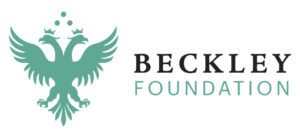The Beckley Foundation is an NGO think tank and research organization in Oxford, United Kingdom. It was founded in 1998 by its Executive Director Amanda Feilding.
The foundation conducts research on the effects of psychoactive substances on the brain. Their goal is to add to the knowledge base of the potential benefits and harms of these substances. This will help researchers find new ways to treat illnesses. The foundation partners and collaborates with organizations and institutions around the world. They include Johns Hopkins University (United States), Hannover Medical School (Germany), Madrid Complutense University (Spain), and the International Center for Ethnobotanical Education Research & Service (ICEERS).
Amanda Feilding leads the scientific program arm of the foundation. This program focuses on studying cannabis, MDMA (3,4-methyl enedioxy methamphetamine), and the psychedelics LSD (lysergic acid diethylamide), psilocybin (3-(2-Dimethylaminoethyl)indol-4-yl dihydrogen phosphate), DMT (dimethyltryptamine), and 5-MeO-DMT (5-methoxy-N,N-dimethyltryptamine). The research takes on a variety of forms including observing the brain in real-time under the influence of these substances. The foundation also supports and directs clinical trials.
Visualizing the Brain Under the Influence
In 2015 and 2016, the Beckley Foundation conducted and supported several studies involving LSD. One study used multimodal neural imaging techniques on the brains of human subjects.1 It found marked changes in electrical activity, blood flow, and communication patterns in the brain. This was the first study of its kind done in humans. Another major finding was the relationship seen between changes in brain function and the subject’s reporting of “ego dissolution” and “altered meaning.” A related study in humans using fMRI (functional magnetic resonance imaging) confirmed the involvement of these areas of the brain in producing the effects.2 This study also found the areas of the brain with the greatest increase in connectivity under LSD are rich in serotonin 5-HT2A receptors. Further work by the foundation has shed light on the dual nature of LSD. It can cause acute psychosis-like symptoms but also improves a person’s psychological well-being over the mid- to long-term.3 The researchers believe LSD does this by causing “loosened cognition” in conjunction with 5-HT2A receptors.
Research funded by the foundation found that like LSD, psilocybin causes ego dissolution in a similar manner in the brains of humans.4 Also, fMRI studies using psilocybin showed decreased activity and connectivity in key centers of the brain.5 The researchers say this decreased activity enables “a state of unconstrained cognition.”
The foundation is funding research investigating the use of psilocybin as a model for early psychosis and use in psychotherapy. A 2013 study using fMRI showed changes in brain function with psilocybin which are similar to those seen in the psychotic state.6 The foundation is also funding early work which is showing promise in using psilocybin for treatment-resistant depression.7 A January 2018 study using fMRI found psilocybin enhances the ability to recall personal memories and emotions.8 This is another way in which psilocybin may be beneficial in psychotherapy.
Abandoning the War on Drugs
The foundation also works to change global drug policies.9,10 The foundation advocates policy reform based on solid and evidence-based science. They encourage world governments to abandon the ‘War on Drugs’ saying this will reduce the unintended negative consequences that poor drug policies have on people and society. The foundation seeks to develop better policies based on reducing harm, increasing cost-effectiveness, improving health, and maintaining human rights. The policy arm of the foundation uses a network of drug policy analysts, political leaders, and Nobel Laureates, among others, to define and explain potential policy changes. These efforts provide a framework for understanding and discussing issues which may be difficult or taboo for some to enter into. New models of drug policy which are more beneficial and create less harm emerge from these collaborations.
More information on the Beckley Foundation and their work is found on their website and their LinkedIn profile.
